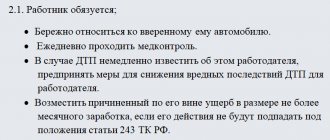What is considered a disciplinary offense?
Disciplinary action is a form of administrative punishment. Relevant for employees who have committed violations of labor regulations or internal discipline. In this regard, separate proceedings are assigned for each specific case.
The legal regulations for conducting disciplinary cases become the main basis for organizing such events. Additional supports are:
- Labor legislation provisions.
- A list of tasks established for a specific job in an enterprise.
Any penalty is legal if it is provided for by the relevant regulations. The procedure for applying such penalties is described in Article 193 of the Labor Code of the Russian Federation.
How does administrative responsibility differ from disciplinary responsibility?
Some ordinary people believe that administrative and disciplinary responsibility are identical, but these are completely different concepts. They differ:
- The nature of the offenses
. Administrative punishment occurs for committing illegal actions that are provided for in the Code of Administrative Offenses and state laws, while at an enterprise a reprimand or dismissal is possible only for violation of labor discipline. - Subjects that can apply penalties
. Disciplinary liability is regulated by internal documents of the company and some norms adopted at the legislative level for specific industries or specialties. That is, only a person’s managers with whom he or she has a working relationship have the right to reprimand. Administrative is imposed by specially authorized bodies. - Types of penalties
. An administrative offense may result in a fine or disqualification. Whereas in an organization only the above penalties are applicable.
About the types of penalties in relation to the manager
Failure to perform in full, or performance of duties with low quality - these are grounds sufficient for the application of various punishments. The rule applies to all employees, not just management. Article 192 of the Labor Code of the Russian Federation provides for the following types of penalties:
- Dismissal.
- Comment.
- Rebuke.
Specific disciplinary provisions for enterprises, federal laws and regulations allow the introduction of other types of punishment. Here is an example of additional acceptable measures:
- Sending warnings that suitability for the position is incomplete.
- In the civil service - dismissal from office.
- Article 81 of the Labor Code of the Russian Federation describes the circumstances leading to dismissal:
- Committing theft.
- Appearing at the workplace under any type of intoxication - alcohol, drugs, and so on.
- Lack of valid reasons for absenteeism.
Compared to ordinary employees, management has much more reasons to be held accountable. There is nothing strange in this, given the responsibility of the manager for what is happening at the enterprise.
Managers have two additional grounds for dismissal:
- Labor obligations were grossly violated, even just once.
- A decision without grounds, as a result of which the company’s property suffers or another type of damage is caused. An example is misuse.
Management has other prohibitions and restrictions, violation of which is sufficient grounds for disciplinary action. For example, such an employee may hold other positions in legal entities if the constituent body of the old enterprise made a positive decision on this issue.
Fines are not disciplinary sanctions
Labor Code in Art. 192 indicates that the types of disciplinary sanctions are established only by the Labor Code of the Russian Federation, other federal laws, charters and regulations on discipline (for example, in railway transport). The introduction of additional penalties is not permitted.
Among employers, so-called fines are popular as punishment for violating labor discipline requirements. The Labor Code does not contain such a definition and does not allow the use of fines as punishment for disciplinary offenses.
The type of impact used is a reduction of part of the salary, especially its bonus component, although the types of disciplinary sanctions under the Labor Code of the Russian Federation do not include it.
By wages, the legislator understands the totality of remuneration for work, compensation and motivational payments. Articles 137 and 138 of the Labor Code of the Russian Federation clearly define when and in what amounts deductions from a worker’s earnings are allowed. In order to justify a reduction in the premium, it is necessary to specify the conditions and indicators from which it is composed. This must be reflected in the provision on bonuses in the employment contract and the provision on remuneration.
If not all conditions are spelled out or there is no signature on the acquaintance, the fine will result in the employee filing a complaint to the labor inspectorate for unjustified deduction. Consequently, applying a fine and reducing the bonus for a misdemeanor is fraught with inspections and legal proceedings for the employer. And if the fines are repeated, there is liability, even criminal liability, for untimely and not fully paid wages (Article 145.1 of the Criminal Code of the Russian Federation). Wage deductions should not be used as a form of disciplinary punishment.
Commissions for the Investigation of Disciplinary Offenses
If the company has a security service, then it may be responsible for conducting such investigations. If it is absent, the responsibility is transferred to the personnel departments. The commission includes representatives of various departments:
- Trade union.
- Personnel.
- Security Service.
The usual composition is limited to just three members. But sometimes they decide to collect a commission from a larger number.
The commission has the right to demand additional explanations from each of its subordinates related to misconduct. In the case of managers, general rules apply. But this does not mean that citizens are obliged to answer everything.
The right of commission members is to send requests for additional documents and to involve third-party specialists in the investigation. For example, if you need to determine whether alcohol intoxication was present at the time of the offense. It is acceptable to seek other types of assistance:
- Engineering.
- Audit.
- Legal.
The creation of commissions is permissible even if there is no direct damage, but the employee’s actions could have caused it. Most often such associations are temporary, but they can also be permanent.
Responsibility of the head of the organization
An entire chapter of the Criminal Code of the Russian Federation is devoted to crimes related to the economy. However, it should be taken into account that in Russia the corporate system is still developing, and therefore the substantive and legal issues of responsibility of management companies have not yet been sufficiently worked out. The Criminal Code is no different in this regard. We can distinguish the following most common crimes, the subjects of which may be heads of organizations:
- illegal entrepreneurship, which means carrying out business activities without registration or in violation of registration rules, submitting documents containing knowingly false information to the registration authority, as well as carrying out business activities without a license (Article 171 of the Criminal Code of the Russian Federation);
- production, acquisition, storage or sale of unmarked goods and products that are subject to mandatory labeling (Article 171.1 of the Criminal Code of the Russian Federation);
- legalization (laundering) of funds or other property acquired by criminal means (Article 174, 174.1 of the Criminal Code of the Russian Federation);
- illegal receipt of a loan (by providing a credit institution with knowingly false information about one’s financial situation) and malicious evasion of repayment of accounts payable (Articles 176 and 177 of the Criminal Code of the Russian Federation). Part 2 of Article 176 of the Criminal Code of the Russian Federation provides for slightly different crimes: illegal receipt of a state targeted loan and the use of a state targeted loan for other than its intended purpose, if these acts entailed causing major damage;
- coercion to complete a transaction or refuse to complete it (Article 179 of the Criminal Code of the Russian Federation);
- illegal receipt and disclosure of information constituting a trade secret (Article 183 of the Criminal Code of the Russian Federation);
- abuse during the issuance of securities, which means the inclusion of knowingly false information in the prospectus for the issue of securities, the approval of a prospectus or report on the results of the issue of securities containing knowingly false information, as well as the placement of issue-grade securities, the issue of which has not passed state registration, if these acts caused major damage (Article 185 of the Criminal Code of the Russian Federation);
- failure to return funds in foreign currency from abroad and evasion of customs duties (Articles 193, 194 of the Criminal Code of the Russian Federation);
- unlawful actions in bankruptcy (concealment of property, information about property, its size, location or other information about property; transfer of property to other possession, alienation or destruction of property; concealment, destruction, falsification of accounting and other accounting documents reflecting the economic activity of the enterprise, satisfaction claims of individual creditors deliberately to the detriment of other creditors), fictitious and deliberate bankruptcy (Articles 195 - 197 of the Criminal Code of the Russian Federation);
- evasion of taxes and fees, failure to fulfill the duties of a tax agent, as well as concealment of property at the expense of which taxes should be collected (Articles 199, 199.1, 199.2 of the Criminal Code of the Russian Federation).
I would like to say separately about the “fashionable” “evasions” today. Art. 177 of the Criminal Code of the Russian Federation provides for criminal liability for malicious evasion of repayment of accounts payable, as well as payment of securities (primarily bills and bonds). In order for the inaction (non-payment of debt) of the head of the organization to become criminal, a set of conditions is necessary: the debt is not repaid (securities are not paid), the debt is more than 250 thousand rubles, and the creditor has a court decision that has entered into force confirming the existence and amount debt. The norm in question contains a term that does not have a clear legislative definition - “maliciousness”. We believe that those lawyers are right who believe that the seriousness of evasion is evidenced, first of all, by the presence of a real opportunity to repay the debt in combination with the intent to fail to pay the debt.
Tax evasion (Article 199 of the Criminal Code of the Russian Federation) can occur through failure to submit tax reports or the inclusion of knowingly false information in them. It is interesting that a large amount for the purposes of this article is the amount of taxes amounting to more than five hundred thousand rubles for a period within three financial years in a row, provided that the share of unpaid taxes and (or) fees exceeds 10 percent of the amounts of taxes and (or) payable. fees, or exceeding one million five hundred thousand rubles.
Typically, the legislator does not require investigative authorities to prove the “maliciousness” of such tax evasion.
In general, an analysis of crimes in the sphere of economic activity shows that the legislator seeks to protect, first of all, centralized norms (on taxes, customs duties, foreign currency, precious metals, and others) in criminal law. The protection of corporate norms has not yet become a priority for the government.
The protection of intra-corporate interests is served by one article of the Code that is quite insidious for a manager - “Abuse of Power” (Article 201 of the Criminal Code of the Russian Federation). It is interesting that the abuse of authority by a person performing managerial functions is committed both through action and inaction. A mandatory feature of a crime is the presence of a goal of obtaining profit or any advantages (including non-property ones). The forms of abuse of power are diverse: concluding a contract that is obviously unfavorable for the organization; lending to obviously insolvent partners; preferential lending to persons who do not have the right to it; concealment of property shortages, etc. Whether this or that act is “abuse” will only be determined by the court, and until that moment the head of the organization can expect very unpleasant times associated with all the “delights” of investigating a crime. Moreover, the corresponding investigation is initiated in the presence of so-called “significant” damage; The extent of the damage is indicated by the victims themselves; the legislation does not establish specific amounts.
In order to protect directors or other management companies, the legislator established an important note to Art. 201 of the Criminal Code of the Russian Federation. If the act caused harm exclusively to a commercial organization that is not a state or municipal enterprise, criminal prosecution is carried out only at the request of this organization or with its consent. By the way, the same rule applies to all crimes provided for in Chapter 23 “Crimes against the interests of the service” of the Criminal Code of the Russian Federation.
Let us note that these articles do not exhaust the possibilities of bringing the head of an organization to criminal liability. Thus, certain chapters of the Code provide for crimes in the field of ecology (Articles 246 - 247, 250 - 255 of the Criminal Code of the Russian Federation and others) and public health (Articles 236 - 238 of the Criminal Code of the Russian Federation).
In general, the Criminal Code contains many elements of crimes that imply a violation of any established rules, associated with significant damage to citizens, the economy, the state or the threat of causing it. According to Russian legislation, a legal entity is not a subject of criminal liability: it cannot be deprived of liberty or forced to perform correctional labor. In this case, responsibility lies with the officials of the organizations and, above all, their leaders. So it turns out that if a company as a whole operates in violation of the law, this can have serious personal consequences on its director. A reason to think seriously, isn't it?
Thus, it is clear that the position of a manager implies not only various tempting opportunities, wealth and high social status, but also many risks, as well as a high level of responsibility. The last circumstance should be taken into account if you do not want to one day find yourself a defendant before the owners or a defendant in a case of official crime. The result of checking how your actions comply with the law, if not stop you, will at least give a complete picture of the risks. Notified means armed. The ancients said this.
Good reasons
If necessary, the supervisory authority is obliged to listen to the other side. Explanations are provided only in written form.
The position is explained in different ways. For example, the form of explanatory notes. A document in free form, written by hand, standard solution. But some organizations opt for so-called “stencil forms”. In them, the employee is asked to answer several questions by filling out the following columns:
- For what reasons was the disciplinary offense committed?
- Does the employee admit guilt?
- If not, who should be held accountable?
Local regulations specify exactly to whom such notes are sent.
Another option is when explanations are recorded using a special act. The employee confirms his explanations with a personal signature. This procedure also applies to managers.
Even if an employee refuses to give an explanation, this is not an obstacle to applying penalties.
The main thing is to prove that all facts were taken into account, including:
- The employee's attitude towards his work.
- Behavior for the previous period.
- The circumstances of the offense.
- The severity of the offense.
The employee's claim for reinstatement may be satisfied. But to do this, the court must decide that an offense occurred, but not all circumstances were taken into account.
What is discipline and punishment
Any organization has a number of rules and regulations that govern the work process. Strict adherence to them by the employee during working hours is labor discipline. Rules and norms of labor discipline, requirements for their compliance, responsibilities in the work process are reflected in the job description, internal labor regulations, and other internal regulations of the organization. The employer has the right to apply disciplinary sanctions for failure to fulfill official duties, violation of labor discipline under Art. 192 Labor Code of the Russian Federation.
When starting work, it is important for an employee to know what is required of him during the work process. If he doesn’t know this, then he’s not violating anything and there’s nothing to punish him for either. It is important to familiarize the employee with all regulations before signing an employment contract. This is a requirement of Article 68 of the Labor Code of the Russian Federation.
During the work process, the worker is obliged to obey internal regulations and perform job duties for his position (profession). By not following the rules and not fulfilling official duties, an employee commits a disciplinary offense. In this case, the enterprise administration has the right to influence the violator and apply a disciplinary sanction - a measure of the employer’s influence on the employee in case of failure to perform or improper performance of official duties, violation of labor protection standards and rules, safety regulations and internal labor regulations. This is a punishment that is allowed within the framework of the law for an employee committing an offense at the workplace and during working hours.
The basic rule prescribed in the Labor Code of the Russian Federation is that only one punishment is applied for one disciplinary offense.
Penalized for:
- violation of production standards;
- product defects;
- disclosure of trade secrets, etc.
But all requirements must be enshrined in local regulations and communicated to the employee against his signature.
Dismissal of managers
The dismissal of directors most often occurs for the following reasons:
- Significant material losses for the organization.
- Exceeding official powers when they are used for personal gain or another type of interest.
- Irrational use of the owner's property, although he initially gave other instructions.
- Violation of labor safety and health regulations, resulting in losses.
- Tax and financial violations.
The right of employers in the event of misconduct is to apply disciplinary sanctions or completely waive them. According to Article 195 of the Labor Code of the Russian Federation, punishments are relevant both for managers and for their subordinates and deputies at all levels. It is important that there is sufficient written evidence.
Features of applying disciplinary sanctions to the manager or his deputy
In accordance with the norms of the Labor Code of the Russian Federation, the right to hold an employer liable is held by an individual or legal entity with whom he has concluded an employment contract. According to Art. 280 of the Labor Code of the Russian Federation, the employer in relation to the manager is the owner of the company’s property, or his legal representative.
In general, the procedure for applying a disciplinary sanction to a manager begins with the submission of a memo or other written request from a representative body of employees. The document must reflect the essence of the problem, as well as evidence confirming the guilty actions of the boss. Points to consider:
- The decision to impose a penalty on the director is made by a superior manager, if the company’s charter does not indicate an employee with such powers;
- Prosecution can only be made within one month from the moment the offense was discovered, without taking into account the time the manager was on vacation or sick leave;
- If the violation was committed by the chief accountant of the company, the immediate manager, who is not always the owner, can make a decision to hold him accountable;
- If the director is a founder, the decision to impose a penalty is made by the Board of Directors on the basis of a memorandum;
- The director can be held accountable only after an objective internal investigation, during which the severity and circumstances surrounding the commission of the offense, as well as the boss’s attitude to the work in general, should be taken into account;
- A specific measure must be selected taking into account the characteristics of the employee, the severity of his act and the circumstances under which it was committed (intentional or not, whether it was possible to prevent the consequences, etc.).
If the rights of employees have been violated, or the manager has committed a disciplinary offense that resulted in damage to the enterprise, employees can contact their representative body - the Trade Union, which is empowered to consider such situations and make decisions on the need to contact higher management. In case of systematic neglect of labor laws, citizens can also file complaints with the State Labor Safety Inspectorate, however, in this case, the manager, after inspection, can be brought not only to disciplinary, but also to administrative liability.
The procedure for applying penalties
Penalties are applied to an employee only after the organization and completion of proceedings in accordance with all the rules. The procedure for using penalties is described in Article 193 of the Labor Code of the Russian Federation.
As soon as a violation is discovered, the guilty party is obliged to send a written explanation of what happened to the supervisory authority. If the organization is large, special memos regarding this fact are attached to the application.
After receiving and reviewing the written explanation, the manager must take the following steps:
- Imposing a penalty.
- Creation of a disciplinary commission.
- Making a decision on the dismissal procedure.
The main thing is that the regulatory body itself carries out all stages and monitors compliance with the requirements. Otherwise, there is a high probability that subordinates will challenge one of the documents, the execution of which was required.
How penalties are applied
It is important to punish an employee not only fairly, but also correctly - this will save the company’s management from unpleasant inspections, fines and courts. The procedure for applying disciplinary sanctions records each stage from the moment the offense is discovered until the moment the punishment is imposed. When applying punishment, you should be guided by Article 193 of the Labor Code of the Russian Federation.
The step-by-step procedure for applying disciplinary sanctions to an employee under the Labor Code of the Russian Federation is as follows.
Step 1
We record the detected violation in the report. It’s easy to make the form yourself or use the one we suggested.
At least three employees must sign the act (the one who discovered the violation and two more): the immediate supervisor of the violator, a personnel employee and one of the colleagues.
Step 2
We attach documents confirming the fact of the disciplinary offense.
In the table we have listed the most common violations, what is necessary to confirm them and what risks arise when applying punishment.
| Type of violation | Mandatory documents | Supporting documents | Notes |
| Late | Act on committing a disciplinary offense. Request for an explanation (or confirmation of its delivery). Explanation of the employee (or act of refusal, failure to provide explanations) | Printout of the employee arrival accounting program (or an extract from the arrival journal). Time sheet. Internal labor regulations. Schedule. Job description. Employment contract | The clocks in an enterprise must be very accurate. An error of several minutes is undesirable. Because of this, the imposed penalty is disputed by the employee, and disciplinary action in the form of a reprimand is not applied. |
| Absenteeism | Act on committing a disciplinary offense. Request for an explanation (or confirmation of its delivery). Explanation of the employee (or act of refusal, failure to provide explanations) | Time sheet indicating the time of absence. Internal labor regulations. Schedule. Job description. Employment contract | Lunch time is not included in absenteeism, because... This is the employee's personal time. An employee who has been absent for a long time can suddenly appear with supporting documents, which will cancel such a disciplinary sanction |
| Appearing while intoxicated (or under the influence of other toxic substances) | Act on committing a disciplinary offense. Request for an explanation (or confirmation of its delivery). Explanation of the employee (or act of refusal, failure to provide explanations). Medical examination report. Act on dismissal of an employee from work | Time sheet. Job description. Employment contract. Instructions for occupational health and safety of the employee (if it contains relevant provisions) | Medical examination - only in specialized medical institutions using special equipment. The employee has the right to refuse to undergo such an examination (it is possible to call the police, see Article 20.21 of the Administrative Code). Applying a penalty without attaching a medical report carries risks for the employer |
All documents, with the exception of acts and explanatory notes, are attached in copies. In some organizations, it is customary to supplement the set of documents with an opinion from the legal service on the legality of the penalty and the legal consequences.
Step 3
We ask the offender for an explanation of the offense. This must be done in writing. The request for explanations is sent by registered mail or one copy is delivered in person against signature. The employee provides an explanation within two working days from the receipt of the request. If, after the expiration of the period for giving explanations, it is not provided, an act of refusal is drawn up, and this is not an obstacle to imposing a penalty.
Alina Larina
Senior lawyer, Department of Methodology and Audit, Unistaff Peyrol Company LLC
When registering a disciplinary offense, it is important to comply with the norms of Articles 192 and 193 of the Labor Code of the Russian Federation. The employer is recommended to provide the employee with a request for an explanation in writing, signed by the employee, otherwise the employee will indicate that he did not receive any request for an explanation. The one-month period (it is extended, unlike the 6-month period for committing a misdemeanor) begins to count from the date when the immediate supervisor learned about the misconduct. The fact of detection of a violation is documented in any form, for example, an official memo.
Step 4
After drawing up reports, collecting evidentiary documents and receiving explanations from the employee, the personnel service prepares an order for disciplinary action and submits it to the head of the enterprise for signature. Below is a sample that is convenient to use in your work. An order is drawn up as an administrative document, an act on disciplinary action is not provided for by the Labor Code of the Russian Federation and is not applied in practice (there is an act on the discovery of an offense, an act on recording the employee’s refusal to familiarize himself with the documents).
Step 5
The order must be familiarized to the employee within three working days from the date of signing (Article 193 of the Labor Code of the Russian Federation). In case of refusal to familiarize, a refusal act is drawn up, which is also signed by at least three people.
It looks like this:
The employer has the right to develop its own internal document and establish how to formalize a disciplinary sanction specifically with sample documents (report, act of misconduct). But the main steps are requesting an explanatory note, drawing up an act of refusal, issuing an order and familiarizing yourself with it; it is mandatory to comply with the established sequence; this is a requirement of the Labor Code of the Russian Federation.
Is information about disciplinary sanctions entered into work records?
Information is recorded in writing only in the event of a last resort - dismissal. The main thing is to comply with some requirements regarding the fixation procedure itself.
The first step is to send the employee written notice that a violation has been committed. Based on this, the subordinate himself draws up an explanation.
The second step is issuing an order confirming the application of disciplinary action. The employee must be familiarized with this document.
Within three days maximum, the second party puts a personal signature on the order. If this is not possible, proceed to compilation. Special act regarding violation.
Based on current legislation, it is prohibited to include a reprimand in the work book.
Additional information about documentation
The disciplinary sanction itself is formalized using an order. Its publications are based on the following papers:
- Act if the employee refused the explanatory note.
- Memorandum.
- Explanatory letter.
Any papers containing orders must meet specific requirements. If the organization itself has developed standard forms, then in practice they are not abandoned.
About restrictions, challenging
The application of disciplinary sanctions requires a careful approach on the part of the manager. Moreover, if you plan to terminate the Labor Contract with the other party. There are categories of employees for whom dismissal is unacceptable:
- Pregnant women. Contracts with them cannot be terminated, even in case of serious violations.
- Minors. If the procedure is carried out, it is only with the participation of the guardianship and trusteeship authorities.
A dismissed employee is allowed to challenge decisions out of court. To do this, a complaint is drawn up, the addressee of which is the state labor inspectorate. If the court examined the case and decided that the collection is illegal, then the punishment will also be recognized as such.
In case of reinstatement at work, additional compensation is paid for forced absence.
Regarding statutes of limitations
All disciplinary sanctions against one employee are kept in a personal file; there are no exceptions to this rule. Thanks to this, it will be easier to draw up a general description of how this or that citizen relates to his responsibilities. And about how he organizes the labor regime.
Such documents are resorted to in case of hiring for a new position or in case of repeated violations.
Disciplinary action must be taken no later than 1 month after the misconduct is discovered. Otherwise, the period for taking action expires. After this, it will no longer be possible to return to the same offense.
Terms of attraction
There are strictly defined deadlines for applying disciplinary action. Disciplinary action is applied no later than one month from the moment the violation is discovered. This period cannot include time of absence for valid reasons (illness or vacation). Also, the time for agreeing on the punishment with the trade union, if there is one in the company (elected body), is not taken into account.
A disciplinary sanction cannot be applied later than six months from the date of commission of the disciplinary offense. Violations discovered after an audit, audit or inspection of financial and economic activities are subject to punishment no later than two years from the date of commission. If criminal proceedings are ongoing in parallel, then its time is not taken into account in the specified time frame.
You cannot punish twice for one offense. This means that reprimanding and dismissing will not work. The employer chooses and applies only one type of punishment.
ConsultantPlus experts examined what disciplinary sanction can be imposed on an employee for absenteeism. Use these instructions for free.









